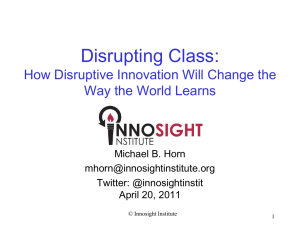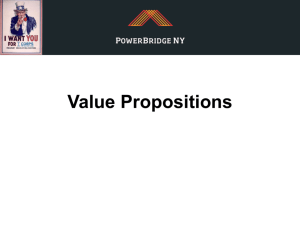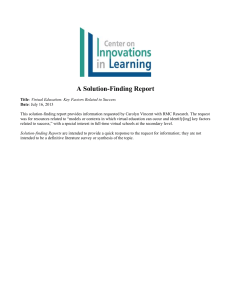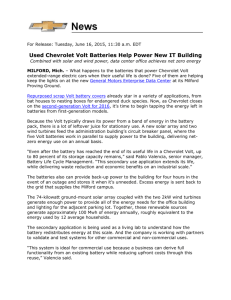Jobs To Be Done Overview
advertisement
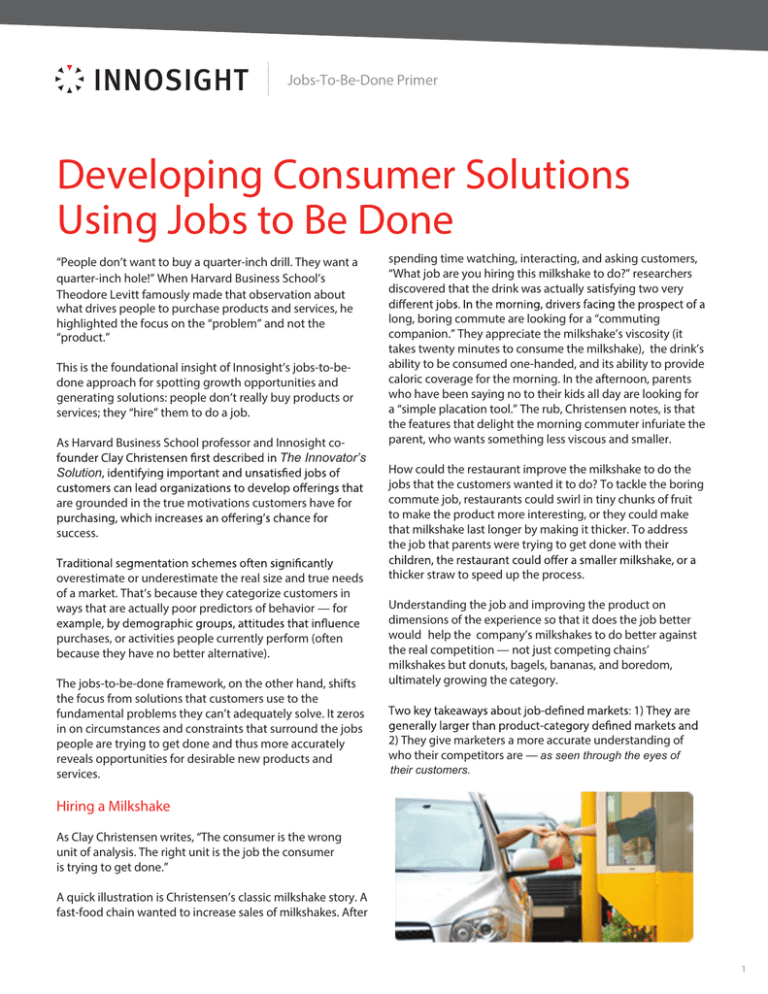
Jobs-To-Be-Done Primer Developing Consumer Solutions Using Jobs to Be Done “People don’t want to buy a quarter-inch drill. They want a quarter-inch hole!” When Harvard Business School’s Theodore Levitt famously made that observation about what drives people to purchase products and services, he highlighted the focus on the “problem” and not the “product.” This is the foundational insight of Innosight’s jobs-to-bedone approach for spotting growth opportunities and generating solutions: people don’t really buy products or services; they “hire” them to do a job. As Harvard Business School professor and Innosight coThe Innovator’s Solution are grounded in the true motivations customers have for success. overestimate or underestimate the real size and true needs of a market. That’s because they categorize customers in ways that are actually poor predictors of behavior — for purchases, or activities people currently perform (often because they have no better alternative). The jobs-to-be-done framework, on the other hand, shifts the focus from solutions that customers use to the fundamental problems they can’t adequately solve. It zeros in on circumstances and constraints that surround the jobs people are trying to get done and thus more accurately reveals opportunities for desirable new products and services. spending time watching, interacting, and asking customers, “What job are you hiring this milkshake to do?” researchers discovered that the drink was actually satisfying two very long, boring commute are looking for a “commuting companion.” They appreciate the milkshake’s viscosity (it takes twenty minutes to consume the milkshake), the drink’s ability to be consumed one-handed, and its ability to provide caloric coverage for the morning. In the afternoon, parents who have been saying no to their kids all day are looking for a “simple placation tool.” The rub, Christensen notes, is that the features that delight the morning commuter infuriate the parent, who wants something less viscous and smaller. How could the restaurant improve the milkshake to do the jobs that the customers wanted it to do? To tackle the boring commute job, restaurants could swirl in tiny chunks of fruit to make the product more interesting, or they could make that milkshake last longer by making it thicker. To address the job that parents were trying to get done with their thicker straw to speed up the process. Understanding the job and improving the product on dimensions of the experience so that it does the job better would help the company’s milkshakes to do better against the real competition — not just competing chains’ milkshakes but donuts, bagels, bananas, and boredom, ultimately growing the category. 2) They give marketers a more accurate understanding of who their competitors are — as seen through the eyes of their customers. Hiring a Milkshake As Clay Christensen writes, “The consumer is the wrong unit of analysis. The right unit is the job the consumer is trying to get done.” A quick illustration is Christensen’s classic milkshake story. A fast-food chain wanted to increase sales of milkshakes. After 1 Jobs-To-Be-Done Primer Understanding the Functional, Emotional and Social Jobs People are not one-dimensional and their purchasing decisions go beyond functional criteria of a product or service. There are also emotional and social components that consumers want fulfilled when they make a purchase. • The functional job describes how the consumer gets • The emotional job describes how the customer feels or wants to feel. • The social job describes how the customer wants to be perceived by others. In India, for example, it is estimated that 80% of households have no refrigerators because they are too expensive and/or because these households have spotty access to electricity. When Godrej, a leading manufacturer of white goods in Indian, began looking for ways to improve sales to these noncompensating behaviors, such as communal refrigerators. On closer examination, they discovered that a primary job to be done— “help me keep my leftovers cool enough so they don’t spoil”—did not require a standard refrigerator. Godrej’s solution was ChotuKool, a portable and affordable cooling device that keeps food cool for a few days and can be powered off the electrical grid. Impact Story: The Chevrolet Volt To illustrate, consider a married couple who are buying a car seat for the newborn. • Their functional job: “Help us keep our baby secure when she is riding in the car.” • Their emotional job: “We want to know our baby is safe and feel like we’re being good, protective parents.” • Their social job: “Show other couples that we have the best and safest baby gear.” This holistic view ensures that researchers don’t overlook aspects of the customer experience that could be critical to creating a successful solution. Jobs Left Undone: Identifying Barriers to Consumption and Compensating Behaviors Consumption barriers may prevent certain individuals from participating in a market, even when the solutions would theoretically help them accomplish an important and barriers inhibiting “non-consumers” from getting an important and unsatisfied job done. The most common barriers are: • Skills: Too complicated to use or requires additional knowledge/skills • Wealth: Beyond what the customer can afford • Access: Not readily available/conveniently located • Time: Takes too much time to use United States, they knew they had to go beyond a traditional customer research and segmentation approach to attract and convince early considerers. Going to market with a category-creating product presents unique challenges. Breakthrough products can often generate the market because of the "unknown" factor, which can leave interested buyers on the fence. For Chevy, it was critical to have a deep understanding of the needs of its target consumers: the early considerers who could also become passionate brand ambassadors. Chevrolet needed to develop equally breakthrough marketplace positioning that would educate consumers and quickly stimulate demand. In collaboration with Innosight, the company launched a jobs-tobe-done project to better understand customer needs. The work steered Chevrolet to recognize that time-in-market would be a key differentiator among primary target customers: early purchasers would be motivated by a different set of jobs than later purchasers. For example, early considerers had an emotional job to “feel like I’m leading change with green technology” and a social job “to be recognized a tech pioneer.” Identifying the barriers to consumptions can also lead to insights into compensating behaviors—an attempt by a customer to invent or improvise a solution to a job that is “do-it-yourself” solutions, highlighting that existing solutions are not adequately solving the job. 2 Jobs-To-Be-Done Primer How Innosight Can Help Innosight is an innovation and strategy consulting Armed with these insights, Chevrolet and Innosight language that spoke directly to the jobs that Volt target The launch of the Volt was met with wide acclaim and many industry accolades—including Motor Trend's 2011 Car of the Year and the 2012 European Car of the Year. (In Europe, the Volt platform is the basis for the Opel Ampera.) comprehensive consulting model facilitates the discovery of new, high-growth markets and the rapid creation of breakthrough products and services. Innosight has worked with one-third of the Fortune 50 as well as with national governments and higher ed institutions. Contact us at +1-781-652-7200, email inquiries@innosight.com or visit www.innosight.com. These early endorsements helped build anticipation and began the wide roll out to dealers across the United States and global markets in the fall of 2011. the world's #1 bestselling plug-in car, GM Vice Chairman Steve Girsky said, "Customer satisfaction on the Volt is higher than any product we sell." Says Tony Posawatz, the director of the Chevy Volt vehicle line, "The outside perspective that the Innosight team provided us really opened up our eyes to the possibilities of how you do an innovative product." Innosight Headquarters 92 Hayden Avenue Lexington, MA 02421 United States Phone: +1-781-652-7200 Email: inquiries@innosight.com Innosight Europe Ateliers de la Ville de Renens Avenue du 24 Janvier 11 1020 Renens/Lausanne Switzerland Phone: +41-21-632-7831 Email: inquiries@innosight.com c Innosight 8 Eu Tong Sen Street #15-89, The Central Singapore 059818 Phone: +65-6884-9375 Email: info-sg@innosight.com 3

